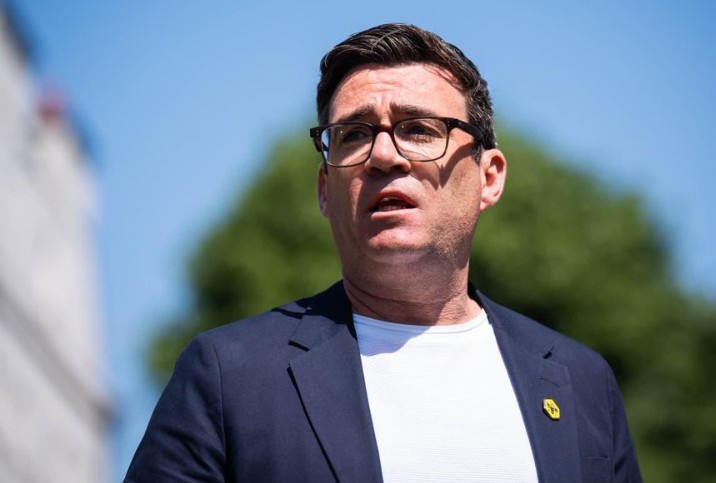‘I’m always causing trouble’: Andy Burnham sparks Downing Street outrage
Manchester Mayor Andy Burnham has once again stirred political chatter, leaving Westminster insiders less than impressed.
Speaking at the historic Victoria Baths on Wednesday, Burnham delivered his address to tech leaders in a venue that once housed 6ft of chlorinated water.
“I’m always causing trouble,” he quipped. “I’ve spent my life in the political deep end, but I’m actually giving a speech from the actual deep end.”
The remark drew laughter, but also hinted at the turbulence the mayor seems to thrive on. For weeks, speculation has swirled over a potential return to Westminster and a bid for Labour leadership.
“People have contacted me throughout the summer, yeah,” Burnham said when asked if colleagues were preparing to support his third tilt at party leadership.
“I’m not going to say to you that that hasn’t happened…but it’s more a decision for those people than it is for me.”
Downing Street officials, however, were far less amused.
“Some politicians like governing and some would prefer to give interviews, and this all feels a bit desperate to be quite honest,” a Government source told reporters.
“I hope he will either come up with credible ideas or manage to regain his interest in his current job as mayor of Manchester.”
For Burnham, the attention is flattering yet puzzling. He admitted feeling “honoured to be in this position” and “odd” that Westminster debates often draw him in.
Speculation is rife among MPs, with many recalling Burnham’s 2017 departure from Parliament as a relief from the toxic culture of Westminster.
He has criticised the environment as one where the “hounds of hell” descend on anyone who missteps, citing Angela Rayner as a recent example.
“There is a group of people who are like ‘deliver us Saint Andy’, and when Keir makes a mistake, there is a caucus of people who say: ‘I wish Andy was the leader, he wouldn’t have done that’,” one backbencher said.
Another added, “What we have to do as a party is to regain confidence in the North of England. Keir Starmer is never going to achieve that, and Andy could begin to pull it back.”
Burnham’s alliances include Lucy Powell, the recently ousted Manchester MP widely tipped to succeed Rayner as Labour deputy next month.
Burnham revealed that Powell is an “independent sort of voice”, reminiscent of John Prescott under Tony Blair, capable of reversing Labour’s “alienation and demoralisation” in the Commons.
Yet there are practical hurdles. To return to Westminster, Burnham would need to resign as mayor, contest a by-election, probably in a Manchester seat, and gain approval from the Labour Party’s National Executive Committee.
He would face opposition from Reform UK in some Mancunian suburbs and likely minimal backing from Labour HQ in Southwark. Some insiders doubt even Cabinet ministers would campaign for him, fearing it could be seen as a disloyalty to Starmer.
If he secured a seat, Burnham would still require 80 nominations to officially challenge the Labour leader. And, if Starmer stands again, he would face a head-to-head with the party’s first electoral-winning leader in 14 years.
Some warn that another leadership contest could distract the party while Reform gains traction in polls.
“I think Andy’s a wonderful person, but my view is that right now is not right,” one ally said. “It just gives the Labour Party a chance to talk to themselves. It just seems a bit bonkers, and that’s why people are worried because they don’t want to see a contest.”
Critics also question whether Burnham has a coherent strategy for southern marginal seats, the vision to rejuvenate Labour nationally, or the resilience to reform the party.
“He doesn’t like doing the difficult stuff,” a former colleague said. “Keir can be ruthless, but not Andy.”
In Manchester, Burnham is focused on promoting a political agenda he claims has been missing in No 10.
“What I’m trying to put forward here is that plan to turn the country around, or the plan to beat Reform,” he said.
His proposals include adjusting council tax to increase payments for the wealthy and pensioners, introducing a 50p top rate of tax, borrowing tens of billions to fund social housing, and working with progressive parties.
“It’s the opposite of Westminster politics,” he added. “What we run here is long-term, place first, and very collaborative.
That’s the Manchester model. And I do think the Manchester model needs to be used, the values of it, to change politics at the national level.”
Despite persistent questions about a return to national politics, Burnham denied plotting a comeback. Yet he left room for speculation when asked about his prime ministerial ambitions.
“I stood twice to be leader of the Labour Party,” he said. “And I think that tells you, doesn’t it?”






